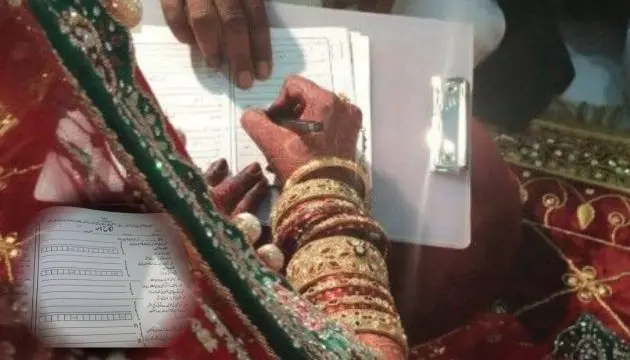ISLAMABAD: The Ministry of Law and Justice held a significant meeting on Tuesday regarding the Nikahnama, the official marriage contract, which highlighted the absence of an official Urdu version. Officials were surprised to find that only an English version was published in the official gazette.
According to a report in a private newspaper, urgent meetings in Islamabad were called following directives from the Lahore High Court (LHC) to address issues in the Nikahnama affecting property disputes, especially impacting women.
Participants requested the official Urdu version of the Nikahnama from all provinces to identify discrepancies and propose solutions for resolving issues related to marital assets. Sources familiar with the discussions revealed that no official Urdu translation could be located, which was unexpected.
“In certain areas of Punjab, Sindh, and Khyber Pakhtunkhwa, Nikahnamas are being registered in local languages without legal sanction,” added the source.
The absence of a standardized Urdu version has led to translation inconsistencies, contributing to an increase in disputes over dowry and property rights.
Another high-level meeting chaired by the Federal Law Secretary addressed concerns about marital assets and sought input from stakeholders to improve the resolution of marital disputes.
— ALSO READ —
Imran Khan criticises KP govt for bypassing him on budget, calls for legal review
The LHC has assigned an eight-member committee to review proposed amendments to Pakistan’s Muslim Family Laws Ordinance, with a focus on Section 10A concerning matrimonial property rights.
Previously, President Asif Ali Zardari approved the Islamabad Capital Territory Child Marriage Restraint Bill, as announced in a notification by the Presidency shared by PPP Senator Sherry Rehman.
The bill aims to safeguard children’s rights and eliminate marriages under the age of 18. It reached the presidency on May 27 after approval from both houses of parliament.
However, the legislation faced opposition from religious groups, including the Council of Islamic Ideology (CII), which argued that categorizing underage marriage as rape contradicted Islamic law.
“The Islamabad Capital Territory Child Marriage Restraint Bill, 2025, has been approved as passed by Parliament,” stated the notification.














